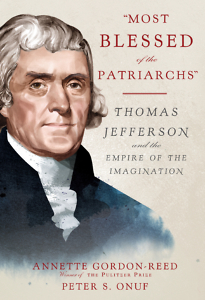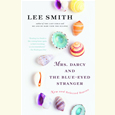Jefferson Family Values
Annette Gordon-Reed and Peter S. Onuf demystify a founding father
Annette Gordon-Reed has written two books about Thomas Jefferson, including The Hemingses of Monticello: An American Family, a book about Jefferson’s enslaved mistress, Sally Hemings, which won both the National Book Award and the Pulitzer Prize. Peter S. Onuf has written multiple books about Jefferson and his times, including The Mind of Thomas Jefferson. In Most Blessed of the Patriarchs: Thomas Jefferson and the Empire of the Imagination, these leading scholars have joined forces to, in their words, “explicate the life of an endlessly fascinating figure of American history.” The result is a book that explores the ideas, times, and misconceptions about a founding father often—and incorrectly, the authors believe—described as indecipherable.

Thomas Jefferson’s life has already been dissected, criticized, and chronicled more than any other of the founding generation. But much continues to be learned and, as Gordon-Reed and Onuf note, “We now have so much more available information about him that a reassessment of him based on what we now ‘know’ is very much in order.” But these historians also understand that modern values are sometimes unfairly forced onto events that occurred in much different times. They try to avoid that trap, knowing that Jefferson’s reputation has swung so far—from honored saint to vilified sinner—that any serious reevaluation of his life must be true to the times in which he lived. In this they mostly succeed, in part by making frequent references to the laws and customs of the late-eighteenth and early-nineteenth centuries.
Most Blessed of the Patriarchs is a non-chronological look at Jefferson’s views on life, politics, and culture. Organized into three sections, titled “Patriarch,” “Traveller,” and “Enthusiast,” the book documents the way Jefferson viewed himself as much as the way his contemporaries saw him. Indeed, the book’s title comes from a 1793 letter in which he referred to himself as a fortunate patriarch, surrounded by home and family. Jefferson believed family ties were more important than anything else. “And,” as Gordon-Reed and Onuf write, “well-governed families, he thought, were the foundation of republican self-government.” Enlightened patriarchs, lords of the male-dominated world into which Jefferson was born and raised, would, in his view, shape the minds of the next generations, who would continue to guard against despotism.
But the word “patriarch” has other connotations, and Gordon-Reed and Onuf devote a significant portion of their book to Jefferson’s life as a slave owner. If, as Jefferson often stated, he believed slavery to be a breeding ground of despotism, why didn’t he do more to stop it, or at least free those who worked his own lands?
 Slavery is a difficult, emotion-laden subject, and Gordon-Reed and Onuf do an admirable job of explaining how Jefferson’s interactions with slaves—including the children he produced with Sally Hemings—and his Enlightenment philosophy conspired to diminish his anti-slavery zeal. These contradictory feelings, the authors note, “rested comfortably … in the mind of a man who fervently, and some might say naively, believed in the notion of inevitable human progress.” Although his generation, already burdened with the tasks of throwing off the yoke of monarchy and creating a new nation, might not be able to eliminate slavery as well, Jefferson hoped the next generation would accomplish abolition as subsequent patriarchs realized how corrupting the institution was.
Slavery is a difficult, emotion-laden subject, and Gordon-Reed and Onuf do an admirable job of explaining how Jefferson’s interactions with slaves—including the children he produced with Sally Hemings—and his Enlightenment philosophy conspired to diminish his anti-slavery zeal. These contradictory feelings, the authors note, “rested comfortably … in the mind of a man who fervently, and some might say naively, believed in the notion of inevitable human progress.” Although his generation, already burdened with the tasks of throwing off the yoke of monarchy and creating a new nation, might not be able to eliminate slavery as well, Jefferson hoped the next generation would accomplish abolition as subsequent patriarchs realized how corrupting the institution was.
Needless to say, slavery did not die as Jefferson hoped, and his failure of leadership on the issue left a stain on his reputation. But in explaining his inaction, Gordon-Reed and Onuf at least allow an understanding of the failure in the context of Jefferson’s world, a world that also included many great accomplishments. Most Blessed of the Patriarchs addresses the whole Jefferson, demystifying a man who, in both popular and scholarly histories, has often been inaccurately portrayed. The authors agree that he was a complicated man, though no more so than most, and his views on human development, religion, and government were typically nuanced, carefully reasoned, and accessible to modern audiences.
Gordon-Reed and Onuf believe that Jefferson scholarship will continue to evolve as more and more material becomes available. Jefferson left behind vast numbers of letters and other writings, and his wide circle of friends, correspondents, and family also produced troves of information that historians have not yet entirely catalogued, let alone examined in detail. In the meantime, Most Blessed of the Patriarchs should be read by anyone hoping to understand the man “who had his hand in so many disparate parts of the nation’s beginnings that it is impossible to understand eighteenth and nineteenth century America—and the country the United States has become—without grappling with him and his legacy.”

A Michigan native, Chris Scott is an unrepentant Yankee who arrived in Nashville more than twenty-five years ago and has gradually adapted to Southern ways. He is a geologist by profession and an historian by avocation.


